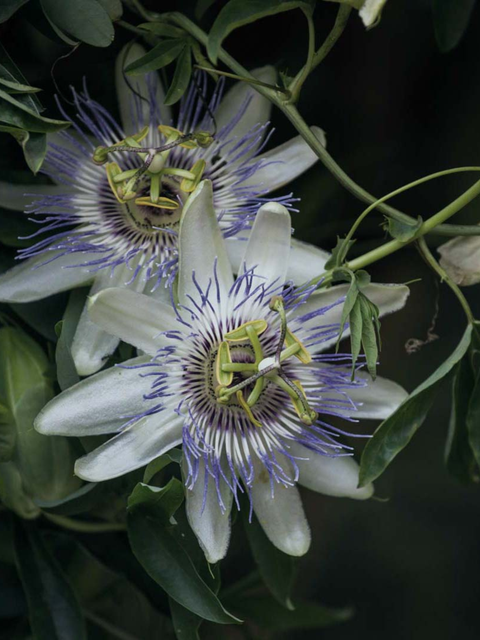
Ingredient Page: Passion Fruit Seed Oil
You know that purple-skinned, refreshingly sweet, and citrusy fruit that you can easily enjoy on a hot summer day? Small and round with a juicy center filled with pulps and seeds, Passion Fruit offers quite an instant feeling of hydration upon consumption. But did you know it’s not just for eating?
This refreshingly hydrating fruit plays a big part in our Sacred Serum! We’d love nothing more than to tell you why we love and how we use Passion Fruit in our Sacred Serum, so stay tuned!
Experience the enchanting healing power of nature’s most revered plants with our potent Sacred Serum. Try it today, risk-free, with a 30-day satisfaction guarantee. See the magic for yourself – your best self is waiting.
|
Type: Passion Fruit Seed Oil is derived from the seeds of Passiflora edulis, a climbing vine native to the thriving tropical regions of South America. History: Passion fruit has been used to heal wounds and settle nerves. Benefits: It is known as a superfruit with anti-inflammatory, anti-itch, and deeply moisturizing properties. A Sacred Secret? This bright yellow oil can reduce skin fatigue² and exhibit wound-healing effects³ with its anti-inflammatory and anti-itch properties. It’s also full of moisturizing omega 6s. Its aroma reduces anxiety and can be rubbed into the skin to soothe tired and achy muscles. |
Background: Passion Fruit Seed Oil
Passion Fruit Seed Oil is derived from the seeds of Passiflora edulis, a climbing vine native to the thriving tropical regions of South America. Passion fruit is also known as maracuja, and it was used to treat ailments like skin infections and digestive issues.
Its discovery dates back to the 16th century when Spanish explorers first encountered the plant. The Spanish brought Passion fruit back to Spain, where they cultivated it and used it in different products, but other parts of the world wouldn’t discover Passion fruit until the 19th century.
Today, Passion Fruit Seed Oil is widely used in cosmetics and personal care products. It is also used in a variety of culinary applications, such as salad dressings and marinades.

Benefits include:
- Locks in moisture and replenishes your skin’s natural oils
- Protects your skin against oxidative damage
- Soothes skin irritations and reduces redness and inflammation
- Prevents skin aging and fights signs of aging
Sacred Serum & Passion Fruit Seed Oil
Sacred Serum adapts to your skin type due to a balanced formula of botanical super-food flowers, and plant and seed oils. Working synergistically with the 26 other organic ingredients in Sacred Serum, Passion Fruit Seed Oil goes deep into the skin to feed, protect, and beautify.
Sacred Serum Benefits:
- Deeply moisturizes for an instant visible glow;
- Reduces inflammation and promotes cell regeneration for a visibly youthful glow;
- Amplified by 777 mg USA-certified organic full-spectrum Hemp extract;
- Has a light texture that quickly absorbs into the skin for an instant smoothing and soothing effect;
- Protects you from environmental damage using powerful antioxidants, fatty acids, and vitamins A, B, C, D, E;
- Results in unbelievably smoother, brighter skin, visibly transformed in a few days.
Why Choose Organic, Cold-Pressed Passion Fruit Oil?
Embracing organic means indulging in nutrient-dense elements, untouched by harmful chemicals and pesticides. The secret to glowing skin lies in an abundance of vitamins and nutrients, hence Sacred Rituel’s commitment to the purest organic ingredients.
-
Organic (Biodynamic) Label: Refers to how ingredients are grown and harvested.
-
Cold-Pressed Label: Refers to how ingredients are processed from a plant or seed to oil. When oils are cold-pressed, they are extracted from their source using mechanical methods rather than heat or solvents.
With cold-pressed oils, there is very little processing, which allows them to retain important nutrients responsible for healing. Ultimately, cold pressing delivers a potent product that's highly effective AND safe because there aren't any additives. It’s a win/win for your skin!
All Sacred Rituel ingredients are made without:
- Artificial Colors & Dyes
-
Preservatives, Parabens, Phthalates
Preservatives: May be used in cosmetics to prevent the growth of harmful bacteria and mold. Parabens and formaldehyde-releasing preservatives are commonly used preservatives in cosmetic and personal care products.
Parabens: Are preservatives used in a wide variety of personal care products and foods to prevent the growth of microbes. These endocrine-disrupting chemicals can be absorbed through the skin, blood, and digestive system.[1]
Phthalates: Pronounced THAL-ates, these chemicals, which are linked to endocrine disruption, developmental and reproductive toxicity, and cancer, have been banned from cosmetics in the European Union but still remain prevalent in U.S. products.
Methylisothiazolinone (MIT) & Methylchloroisothiazolinone (CMIT): They may be hard to pronounce, but they can be even harder on the body. These common preservatives are found in many liquid personal care products and have been linked to lung toxicity,[1] allergic reactions, and possible neurotoxicity.
- Synthetic Fragrance
- Fillers, Stabilizers, & Binders
- Nanomaterial & Nanoparticles
- Retinol & Retinol Compounds
Sacred Secrets: All Things Passion Fruit Seed Oil
What is Passion Fruit Seed Oil?
Passion Fruit Seed Oil is a nutty, slightly yellow, lightweight oil extracted from Passion fruit seeds. It features plenty of essential fatty acids, antioxidants, and nutrients and is known for its moisturizing and nourishing properties. It can be used on its own or blended with other oils for added benefits, so you’ll sometimes see it used as a carrier oil for essential oils.
How is Passion Fruit Seed Oil produced?
You can obtain Passion Fruit Seed Oil by cold-processing Passion fruit seeds. This means you’ll have to grind the seeds into a paste and then press them to get the oil. Once the oil comes out, you’ll have to filter it to remove impurities.
What nutrients are found in Passion Fruit Seed Oil?
Passion Fruit Seed Oil contains plenty of nutrients, including essential fatty acids, minerals, carotenoids, and vitamin A, which provide antioxidant protection, reduce inflammation, and moisturizes the skin.
-
Essential Fatty Acids: These fatty acids are important to our bodies, but we can’t make them by ourselves. There are two main types of essential fatty acids in Passion Fruit Seed Oil: linoleic acid, which is an omega-6 fatty acid that maintains the skin’s natural barrier and reduces inflammation, and oleic acid, an omega-9 fatty acid that nourishes the skin and reduces the appearance of wrinkles.⁶
-
Minerals: Minerals benefit our overall health and skin-wise, the minerals present in Passion Fruit Seed Oil are magnesium, zinc, potassium, iron, calcium, and phosphorous. Magnesium reduces inflammation and redness, while zinc and potassium play a role in maintaining the skin’s natural moisture barrier, and iron, calcium, and phosphorus support skin healing.⁷
-
Carotenoids: These are powerful antioxidants that can protect your skin from free radical damage. Passion Fruit Seed Oil’s lycopene and beta-carotene content is believed to prevent skin aging,⁸, while lutein is thought to protect against light-induced skin damage.⁹
- Vitamin A: Vitamin A is a powerful antioxidant that protects cells from damage caused by free radicals and improves the appearance of fine lines brought on by aging.¹⁰
What are the benefits of Passion Fruit Seed Oil?
So, if Passion Fruit Seed Oil packs all those nutrients, what benefits can it offer your skin?
-
Moisture and nourishment: Passion Fruit Seed Oil helps lock in moisture and replenish your skin’s natural oils. It also protects your skin from environmental damage and reduces inflammation and redness.
-
Protection against oxidation: Passion Fruit Seed Oil contains a high amount of antioxidants, which protects the body from oxidative stress caused by an imbalance between free radicals and antioxidants.
- Inflammation reduction: This oil can soothe and calm irritated or inflamed skin due to conditions like eczema, psoriasis, acne, and others. It also reduces puffiness and dark circles under the eyes.
How can Passion Fruit Seed Oil be used?
As you know, we use Passion Fruit Seed Oil in our Sacred Serum, so you can use it for your skincare needs! Basically, Passion Fruit Seed Oil is a great moisturizer, massage oil, face oil, and bath oil. It can also act as a lip protector or a makeup remover and hair oil to nourish and protect your hair.
Are you recently drawn to plant care or experiencing an urge to learn more about how to use different types of plants? Are you wishing you could live more in tune with nature and utilize the plants around us better?
Maybe you’re being called to explore something like the School of Sacred Wild, or maybe you’ll benefit from Marysia’s herbal apothecary book. Marysia is our co-founder and product formulator, and she shares so much of her knowledge of plants and nature in that wonderful book.
Did you know? Herbalism is the practice of utilizing medicinal plants to support wellness and health. This study dates back to the Paleolithic age and predominantly practiced in Asia and Africa. Marysia Miernowska focuses on European folk herbalism which is an homage to her Polish lineage, finding regenerative ways to heal both people and the Earth.
What are the various types of Passion Fruit Seed Oil?
You can find Passion Fruit Seed Oil in cold-pressed, organic, virgin, refined, or blended versions.
-
Cold-pressed Passion Fruit Seed Oil is extracted from the seeds of the Passion fruit plant without chemicals or heat to preserve all of the seed’s nutrients.
-
Organic Passion Fruit Seed Oil is certified free of synthetic fertilizers, pesticides, and other chemicals, so it’s a natural and sustainable option.
-
Virgin Passion Fruit Seed Oil is cold-pressed and unrefined, meaning it has not been treated with any chemicals or heat.
-
Refined Passion Fruit Seed Oil has been processed to remove impurities, so it’s a less aromatic oil with a longer shelf life.
- Blended Passion Fruit Seed Oil is a combination of different types of Passion Fruit Seed Oil, often including cold-pressed, organic, and/or virgin oil.
What should I consider when using Passion Fruit Seed Oil?
When using Passion Fruit Seed Oil, do your best to pick a pure and high-quality oil. This means that it should be cold-pressed, organic, or unrefined. Cold-pressed oils are the most nutrient-dense, while organic oils are free from pesticides and other chemicals, and unrefined oils are free from any additional processing.
You should also consider the oil’s shelf life. Passion Fruit Seed Oil is best used within six months of opening because it turns rancid over time, so consider buying in smaller quantities and storing it in a cool, dark place.
Is maracuja oil the same as Passion fruit oil?
No, maracuja oil and Passion fruit oil are not the same. Maracuja oil is also known as Passion fruit oil, but it is actually derived from the pulp of the Passion fruit, whereas Passion fruit oil is extracted from the seeds of the Passion fruit.
What does Passion fruit oil smell like?
Passion fruit oil has a light, sweet, and fruity aroma that is reminiscent of the Passion fruit itself.
Is Passion fruit oil edible?
Yes, Passion fruit oil is edible and often used as a flavoring or a salad dressing.
Does Passion fruit help hair growth?
Passion fruit is rich in essential fatty acids, minerals, and vitamins that can help to nourish the scalp, which in turn can help to promote healthy hair growth.
Why does Passion fruit make you sleepy?
Passion fruit contains tryptophan, an amino acid that has a calming effect and can make you sleepy.
Sources:
- Kawakami, S., Morinaga, M., Tsukamoto-Sen, S., Mori, S., Matsui, Y., & Kawama, T. (2021). Constituent Characteristics and Functional Properties of Passion Fruit Seed Extract. Life (Basel, Switzerland), 12(1), 38. https://doi.org/10.3390/life12010038
- Maruki-Uchida, H., Morita, M., Yonei, Y., & Sai, M. (2018). Effect of Passion Fruit Seed Extract Rich in Piceatannol on the Skin of Women: A Randomized, Placebo-Controlled, Double-Blind Trial. Journal of nutritional science and vitaminology, 64(1), 75–80. https://doi.org/10.3177/jnsv.64.75
- Lafoya B, Munroe J, Albig A, Allan R. A comparison of resveratrol and other polyphenolic compounds on Notch activation and endothelial cell activity. PloS one. 2019; 14(1):e0210607. https://doi.org/10.1371/journal.pone.0210607
- Gad, H. A., Roberts, A., Hamzi, S. H., Gad, H. A., Touiss, I., Altyar, A. E., Kensara, O. A., & Ashour, M. L. (2021). Jojoba Oil: An Updated Comprehensive Review on Chemistry, Pharmaceutical Uses, and Toxicity. Polymers (Basel), 13(11), 1711. doi.org/10.3390/polym13111711
- Gad, H. A., Roberts, A., Hamzi, S. H., Gad, H. A., Touiss, I., Altyar, A. E., Kensara, O. A., & Ashour, M. L. (2021). Jojoba Oil: An Updated Comprehensive Review on Chemistry, Pharmaceutical Uses, and Toxicity. Polymers (Basel), 13(11), 1711. doi.org/10.3390/polym13111711
- Berbis, P., Hesse, S., & Privat, Y. (1990). Acides gras essentiels et peau [Essential fatty acids and the skin]. Allergie et immunologie, 22(6), 225–231.
- Haftek, M., Abdayem, R., & Guyonnet-Debersac, P. (2022). Skin Minerals: Key Roles of Inorganic Elements in Skin Physiological Functions. International journal of molecular sciences, 23(11), 6267. https://doi.org/10.3390/ijms23116267
- Balić, A., & Mokos, M. (2019). Do We Utilize Our Knowledge of the Skin Protective Effects of Carotenoids Enough?. Antioxidants (Basel, Switzerland), 8(8), 259. https://doi.org/10.3390/antiox8080259
- Roberts, R. L., Green, J., & Lewis, B. (2009). Lutein and zeaxanthin in eye and skin health. Clinics in dermatology, 27(2), 195–201. https://doi.org/10.1016/j.clindermatol.2008.01.011
- Kafi, R., Kwak, H. S., Schumacher, W. E., Cho, S., Hanft, V. N., Hamilton, T. A., King, A. L., Neal, J. D., Varani, J., Fisher, G. J., Voorhees, J. J., & Kang, S. (2007). Improvement of naturally aged skin with vitamin A (retinol). Archives of dermatology, 143(5), 606–612. https://doi.org/10.1001/archderm.143.5.606






